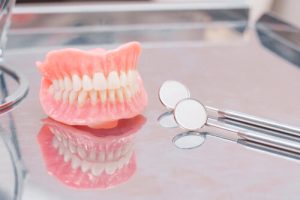Understanding Deep Cleaning: What to Expect
Deep cleaning is a dental procedure customised to treat gum disease and promote oral health. This process goes beyond regular cleaning to get rid of plaque and tartar buildup beneath the gum line. A local anesthetic is often used to relieve pain and ensure comfort during this more invasive procedure.
The Procedure
A deep teeth cleaning includes scaling and root planing. Scaling detaches plaque and tartar buildup from the tooth surfaces and beneath the gum line, while root planing smooths the root surfaces, promoting the reattachment of the gum tissue.
What to Expect
The procedure may cause temporary sensitivity and increased tooth pain, especially in sensitive teeth. Patients might experience inflamed gums and teeth sensitivity to cold foods and drinks for a few hours or up to a few weeks post-treatment.
Aftercare
Post-treatment care includes using a soft-bristled toothbrush, toothpaste for sensitive teeth, and an antimicrobial mouthwash to aid healing. Soft foods are recommended to avoid irritating the gums.
Potential Side Effects
It’s common to experience teeth sensitivity and gum recession after a deep cleaning. Some patients may notice loose teeth or tooth sensitivity as the gum tissue heals.
Healing Process
Proper oral hygiene is crucial during healing. Sometimes, pain persists, indicating a need to consult a dental professional.
Benefits
Deep cleanings help treat gum disease, improve gum health, and prevent tooth loss. Regular cleanings and following the dentist’s recommendations can ensure healthy gums and oral health.
Common Causes of Severe Toothache After Deep Cleaning
Experiencing a severe toothache after deep cleaning can be distressing. Understanding the potential causes can help manage the pain and ensure a swift recovery. Here are some common reasons why you might encounter severe toothache after deep teeth cleaning is done:
Gum Recession: During the deep cleaning procedure, removing tartar and plaque from the gum can cause the gums to recede slightly. Exposure to the tooth roots can lead to increased tooth sensitivity and pain.
Sensitive Teeth: Deep cleanings can exacerbate pre-existing tooth sensitivity. When the protective layers of tartar are removed, the newly exposed root surfaces may react strongly to hot, cold, or sweet foods and beverages.
Inflamed Gums: Scaling and root planing can cause temporary inflammation of the gums. This inflammation and irritation from the dental tools can result in significant discomfort and toothache.
Gum Tissue Healing: After the deep cleaning, the gum tissue begins to heal and reattach to the teeth. This healing process can be difficult or uncomfortable and cause throbbing or aching sensations, especially if there are deep pockets of infection.
Bacterial Infection: In some cases, bacteria that were dislodged during the cleaning might lead to a minor infection if not properly managed. This can cause severe toothache and may require additional treatment from your dentist.
Pressure Sensitivity: A thorough cleaning can sometimes result in temporary sensitivity to pressure. This means chewing or biting might cause sharp pain, particularly if the teeth or gums are still tender from the procedure.
When to Worry: Signs That Need Immediate Attention
 While some discomfort is normal after dental procedures or a deep cleaning, certain symptoms should not be ignored as they may indicate a more serious issue requiring prompt attention from a dental professional. Here are key signs that need immediate attention:
While some discomfort is normal after dental procedures or a deep cleaning, certain symptoms should not be ignored as they may indicate a more serious issue requiring prompt attention from a dental professional. Here are key signs that need immediate attention:
Severe, Unrelenting Pain: While mild to moderate pain is expected, severe or unrelenting pain that does not subside after a few days could signal a problem, such as an infection or damage to the tooth or surrounding tissues.
Swelling and Pus: Noticeable swelling, especially if accompanied by pus or discharge around the gum line, is a clear sign of infection. This requires immediate dental intervention to prevent the infection from spreading.
Fever: A fever following a deep cleaning indicates your body is fighting off an infection. Coupled with other symptoms like pain and swelling, this warrants a visit to your dentist as soon as possible.
Persistent Bleeding: While some bleeding is normal after deep cleaning, continuous or excessive bleeding that doesn’t reduce after a couple of days is a cause for concern and needs professional evaluation.
Loose Teeth: If you notice that your teeth feel loose or are shifting, this could indicate that the support structures of the teeth have been compromised. This needs to be treated promptly to prevent further dental issues.
Difficulty Breathing or Swallowing: Any breathing or swallowing difficulty is an emergency. These symptoms could be an alarm of a severe infection or allergic reaction and require immediate medical attention.
Effective Remedies for Alleviating Pain
Experiencing pain after a deep cleaning can be uncomfortable, but several effective remedies can help alleviate the discomfort and promote healing. Here are some strategies to manage and reduce pain after dental cleaning:
- Over-the-Counter Pain Relievers: Pain relievers can help treat discomfort and reduce inflammation. Always follow the dosage instructions on the label and consult your dentist if you have any concerns.
- Salt Water Rinses: Washing your mouth with warm salt water can help decrease swelling and encourage healing. Dissolve half a teaspoon of salt in a glass of warm water and gently wash your mouth two to three times a day.
- Cold Compresses: Applying a cold compress to the outside of your cheek can help numb the area and reduce swelling. Use the cold compress for 15-20 minutes several times daily.
- Avoiding Certain Foods and Drinks: Avoid hot, cold, or spicy foods and beverages that can exacerbate tooth sensitivity. Stick to soft foods that are easier on your teeth and gums during healing.
- Using Desensitising Toothpaste: Special toothpaste designed for sensitive teeth can help reduce pain and discomfort.
- Maintaining Proper Oral Hygiene: Keep up with regular brushing and flossing to stop plaque buildup and promote healing. Be gentle around the treated areas to avoid causing further pain.
- Topical Anesthetics: Over-the-counter gels or ointments containing benzocaine can temporarily relieve pain by numbing the painful areas. Apply as directed, and consult your dentist for recommendations.
- Antimicrobial Mouthwash: Antimicrobial mouthwashes can help keep your mouth clean and lower the risk of infection. Your dentist may advise using a specific mouthwash during the healing period.
- Hydration: Drinking enough water helps keep your mouth clean and promotes overall health. Staying hydrated can also help reduce discomfort.
- Consult Your Dentist: If pain persists or worsens, it’s important to consult your dentist. They may prescribe stronger pain relievers, recommend additional treatments, or check for complications.
Preventive Measures for Future Deep Cleanings
 Ensuring oral health between deep cleanings can help prevent severe discomfort and maintain overall dental hygiene. Here are some preventive measures to consider between deep cleaning them:
Ensuring oral health between deep cleanings can help prevent severe discomfort and maintain overall dental hygiene. Here are some preventive measures to consider between deep cleaning them:
- Regular Dental Checkups: Schedule dental visits at least every six months. These appointments allow your dentist to monitor your oral health and overcome any issues before they require more invasive treatments like deep cleanings.
- Proper Brushing Technique: Brush your teeth with a soft toothbrush and fluoride toothpaste. Use gentle, circular motions to effectively clean your teeth and gum lines without irritating them.
- Daily Flossing: Get rid of plaque and food particles stuck between your teeth and under the gum line daily. This helps prevent tartar buildup and reduces the risk of gum disease.
- Use Antimicrobial Mouthwash: Incorporate an antimicrobial mouthwash into your daily routine to reduce bacteria and plaque buildup, keeping your gums healthy and reducing the need for deep cleanings.
- Healthy Diet: Stick to a nutritious diet that includes fruits, vegetables, and whole grains. Limit or avoid sugary snacks and beverages, which can cause plaque buildup and gum disease.
- Avoid Tobacco Products: Using tobacco products, including smoking, can greatly elevate your risk of developing gum disease and other dental health problems. Quitting tobacco can greatly improve your overall dental health.
- Address Dental Issues Promptly: If you experience any signs of dental problems, such as tooth sensitivity, pain, or bleeding gums, contact your dentist promptly. Early intervention can prevent more serious issues that require deep cleaning.
- Use Dental Products for Sensitive Teeth: If you have sensitive teeth, use toothpaste and mouthwash specifically designed for tooth sensitivity. This can help reduce discomfort and protect your teeth and gums.
- Educate Yourself on Oral Hygiene: Stay informed about the best practices for oral hygiene. Ask your dentist for tips and recommendations on how to maintain your dental health and prevent the need for frequent deep cleanings.
A severe toothache after deep cleaning can be distressing, but it is crucial to understand the potential causes of increased pain and when to seek professional help. Following proper aftercare and consulting with your dentist can ensure a swift and effective resolution to your discomfort.
If you’re experiencing severe toothache after deep cleaning, don’t hesitate to seek professional advice. At Pearl Dental Care, we help you find relief and ensure your dental health is right. Contact us today at (02) 8880 9257 to schedule a consultation. Trust Pearl Dental Care to provide the care and expertise you need for a pain-free smile.
References
Disadvantages and Advantages of Deep Cleaning Teeth
https://www.healthline.com/health/deep-cleaning-teeth
Tooth Scaling & Root Planing: Deep-Cleaning Treatments
https://my.clevelandclinic.org/health/treatments/23983-tooth-scaling-and-root-planing
Gum disease – NHS
https://www.nhs.uk/conditions/gum-disease/
Antibiotics For Tooth Infection: When Will The Pain Go Away?
https://www.verywellhealth.com/antibiotics-for-tooth-infection-5220697
Dental Treatment in Patients with Leukemia – PMC
https://www.ncbi.nlm.nih.gov/pmc/articles/PMC4345074/



